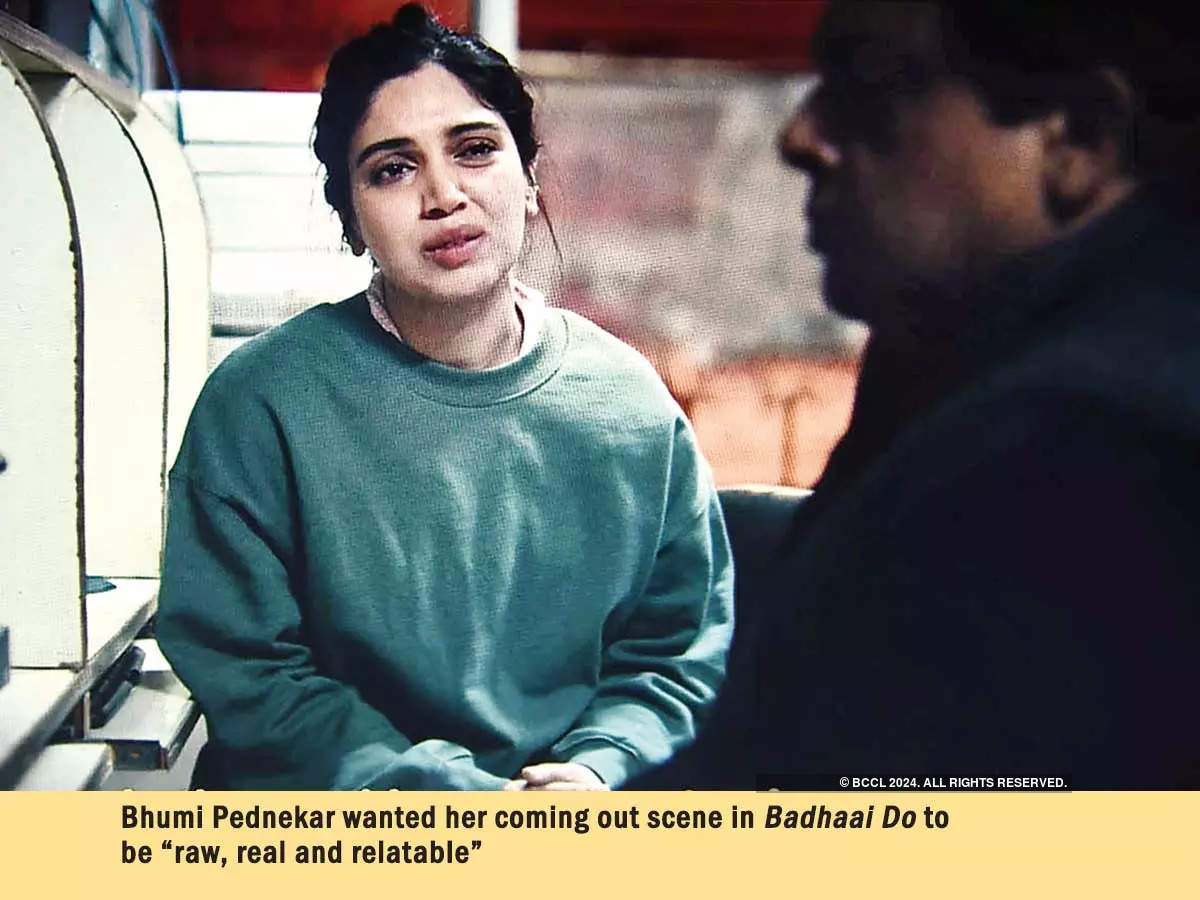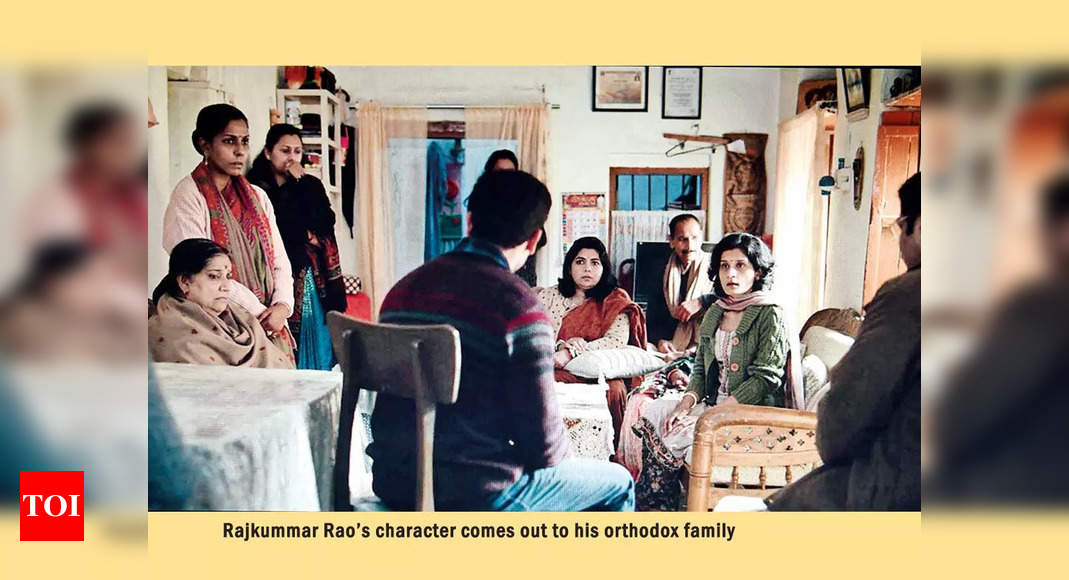Marking four years of Section 377 judgement: Revisiting the coming out scenes from Badhaai Do – Times of India
‘Raj’s coming out scene was so tender’
OUR INTENT WAS NEVER TO PREACH: RAJKUMMAR
Shardul’s coming out scene to his family, his moment with his mother on the terrace, his acceptance by wearing the mask at the pride parade, I feel these scenes have been so strong and powerful because of the intention we had while making this film. Our intention was never to preach or to make any kind of a statement, it was simply to create something that was real, loving and heartwarming, and if it has done that we have succeeded.
‘RAJKUMMAR’S COMING OUT SCENE COULD HAVE BEEN DONE IN 10 DIFFERENT WAYS’
The film’s director Harshavadhan Kulkarni shares that on the day of the shoot of Rajkummar’s coming out scene, the mood on the set was serious. Writer Akshat Ghildial recalls, “It was quiet and the crew was talking in hushed voices. Usually, when Rajkummar comes on the set, he jokes around and chats but that day he went in a corner and sat on his chair. ” Harshvardhan adds, “In the scene, if you see, all other characters are out of focus and Shardul is in focus. They keep saying things about Sumi and he is not even planning to come out to them. But when he hears the word ‘bimaari’, he musters all his courage and says, ‘Agar Sumi bimaar hai toh main bhi hoon’. This scene could have been done in ten different ways, but Rajkummar performed it in such a restrained manner. He’s not accusing his family, he just tells them. The first take of Rajkummar’s scene has been used in the film. ”
‘RAJ BROKE DOWN AFTER THE DIRECTOR SAID CUT, EVERYONE ON SET ALSO STARTED CRYING’
The terrace scene where Sheeba Chadha’s character embraces her son after he comes out is one of the most loved scenes of the film. Harshavardhan says,”Right after the coming out scene, the terrace scene was filmed. Sheebaji’s character comes to him (Rajkummar) and touches his heart. It was sensational writing. It was a truly memorable shot for me as a filmmaker. Even after I said ‘cut’, Raj kept on crying. Then I also started crying. ”
Akshat recalls, “Raj broke down after Harsh said ‘cut’, and even Sheebaji started crying after looking at him. Then our DOP (director of photography) Swapnil who was standing next to them hugged them and started crying. Then Harshavardhan hugged all of them and even he was crying. Everybody on the set was in tears. ” Harshvardhan says, “That coming out scene was so tender, so beautiful, so honest. ”

‘Many from the queer community could relate to Bhumi’s coming out scene’
‘EVEN IF PEOPLE CAN’T RELATE TO BHUMI’S COMING OUT SCENE, THEY CAN RELATE TO THE FATHER-DAUGHTER RELATIONSHIP IN THE FILM’
The makers point out that since home is a microcosm of society, they had to show extreme reactions through family. Akshat says, “Sumi is close to her father and even when her father walks away (after her coming out), she feels so lonely that she goes to him. When we were writing this scene, after a point Bhumi told us that the emotion was not coming across. Harsh and I discussed and he suggested that we should give the father a line and that line should hurt, but without sounding hurtful. Her father says, ‘Mere ghar mein hi kyun?’ It is more of a lament like people say about diseases, ‘Why me’! In this scene, we are trying to show society’s inability to come to terms with homosexuality. The father’s lament comes from that. He’s thinking that why out of all the people in the world my daughter has to be a queer person and hence he doesn’t stand by her in that scene. If you look at it, when Shardul came out to his family, he at least gets a hug from his mother, Sumi does not even get that. Several people from the queer community told us that they related to it because they have heard versions of this line when they came out and their family didn’t accept them. ” He adds, “I remember one of the queer persons from the community told us, ‘You don’t come out of the closet. The closet gets bigger and your friends and family get inside your closet. ’In the last scene of the film, Sumi’s father is shown to have accepted the fact that she is queer. Without any dialogues, he says, ‘Main tumhare saath hoon. ’ He again becomes the guy on whom she can rely. Even people who can’t relate to coming out scenes can relate to the father-daughter relationship. ” Harshavardhan says “This film has become an emotion now. ”
SPOKE TO A LOT OF PEOPLE FROM THE COMMUNITY AND HEARD WHAT ALL THEY WENT THROUGH AND INCORPORATED THAT: BHUMI PEDNEKAR
We live in a society where we, as girls, are always judged for the kind of choices we make and on top of that accepting that you are gay is not something everyone can do. I know a lot of people who have come out to their families and friends and have gone through various difficulties. To understand the mindset of these individuals is very difficult as they are going through something we can never imagine. I spoke to a lot of people from the community and heard what all they went through and tried to incorporate the same into my character and her story. And after watching the film, the kind of response we’ve received is something I’ll always cherish as it has sparked off conversations in the society which is extremely necessary at this point in our lives and society.
For all the latest entertainment News Click Here

